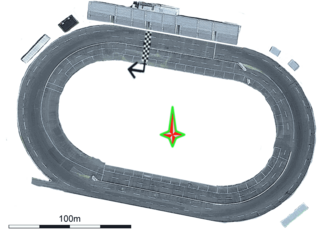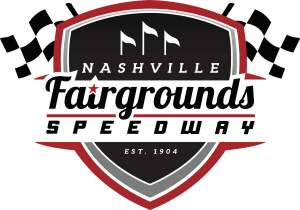
Stock car racing is a form of automobile racing run on oval tracks and road courses measuring approximately 0.25 to 2.66 miles. It originally used production-model cars, hence the name "stock car", but is now run using cars specifically built for racing. It originated in the southern United States; its largest governing body is NASCAR. Its NASCAR Cup Series is the premier top-level series of professional stock car racing. Australia, Canada, New Zealand, Mexico, Brazil, Argentina, and the United Kingdom also have forms of stock car racing. Top-level races typically range between 200 and 600 miles in length.
Dirt track racing is a form of motorsport held on clay or dirt surfaced banked oval race tracks. Dirt track racing started in the United States before World War I and became widespread during the 1920s and 1930s using both automobiles and motorcycles, often running on horse racing tracks. There are a myriad of types of race cars used, from open wheel Sprint cars and Modifieds to stock cars. While open wheel race cars are purpose-built racing vehicles, stock cars can be either purpose-built race cars or street vehicles that have been modified to varying degrees. There are hundreds of local and regional racetracks throughout the United States. The sport is also popular in Australia, New Zealand, Canada, South Africa and the United Kingdom.

South Boston Speedway, or "SoBo", is a short track located just outside South Boston, Virginia. SoBo is located approximately 60 miles (97 km) east of another area familiar to most NASCAR fans, Martinsville. It is owned by Mattco, Inc., the Mattioli family trust that owns Pocono Raceway, with general manager Brandon Brown operating the track, replacing Cathy Rice who retired in 2021 after serving in that role for 21 years and Chase Brashears who was in the role for two years. NASCAR's three national series have raced at the track, though the Cup Series has not done so since 1971, while the Busch Series last raced here in 2000. After the Busch Series left the schedule, the Craftsman Truck Series competed at SoBo for a few years between 2001 and 2003. The SRX Series visited the track in 2022.
Hickory Motor Speedway is a short track located in Hickory, North Carolina. It is one of stock car racing's most storied venues, and is often referred to as the "World's Most Famous Short Track" and the "Birthplace of the NASCAR Stars".

Nashville Fairgrounds Speedway is a 5/8 mile motorsport racetrack located at the Nashville Fairgrounds near downtown Nashville, Tennessee. The track is the second-oldest continually operating track in the United States. The track held NASCAR Grand National/Winston Cup races from 1958 to 1984.

Langley Speedway is a race track located in Hampton, Virginia, United States. Langley Speedway is a paved short track measuring 4/10 mile in length. It is one of the flattest tracks in the region with only six degrees of banking in the corners and two degrees of banking on the straights. In November 1970, it became the site of the last NASCAR Grand National Series race before the series was renamed the Winston Cup. The track is located in front of NASA's Langley Research Center on Commander Shepard Boulevard.
Concord Speedway was a motorsports facility located in the town of Midland, North Carolina, southeast of Concord, North Carolina. The complex featured a 1⁄2-mile asphalt tri-oval and a 1⁄4-mile asphalt oval.

The Madison International Speedway (MIS) is a half-mile paved oval racetrack in the Town of Rutland near Oregon, Wisconsin, United States. With 18-degree banked turns, the track is billed as "The Track of Champions" and "Wisconsin's Fastest Half Mile." The weekly program at the track runs on Friday nights under NASCAR Advance Auto Parts Weekly Series sanction.

Toledo Speedway is a half-mile paved oval racetrack located in Toledo, Ohio, United States. It is owned jointly by Roy Mott and NASCAR. It is operated by NASCAR and run as the sister track to Flat Rock Speedway in Flat Rock, Michigan.

Southside Speedway was a short track used for stock car auto racing located South of Richmond, Virginia in Chesterfield County. On December 11, 2020, the track announced it would be closing permanently after the 2020 season was cancelled due to the COVID-19 pandemic. It is a .333-mile (0.536 km) asphalt oval owned and operated by Sue Clements and Patsy Stargardt. The track originally canceled the 2011 racing season after announcing that owner Sue Clements was battling health problems. However, a shortened 11-week 2011 season later took place, which saw the return of the Legends and Pro Six divisions.

Seekonk Speedway is a family entertainment venue that features racing of all kinds on a semi-banked 1/3 mile asphalt-paved oval, located on U.S. Route 6 in Seekonk, Massachusetts.

The NASCAR Canada Series is a national NASCAR racing series in Canada, and is a continuation of the old CASCAR Super Series which was founded in 1981. It is the top NASCAR touring series in Canada.

Williams Grove Speedway is a half-mile dirt racing track located in Mechanicsburg, Pennsylvania, United States. The speedway opened on May 21, 1939, it has been owned by the Hughes family for over 50 years and has hosted many of the most notable national touring series and some of those most prestigious races in the country. The speedway is entering its 81st year of operation, with racing every Friday from March to October and other special events. One of these special events is the $75,000 to win National Open for sprint cars sanctioned by the World of Outlaws racing series held in late September or early October each year.
Sandusky Speedway is a half-mile automobile race track located south of the city of Sandusky in Perkins Township, Erie County, Ohio, United States. The track features low banking in the turns and long straightaways. It has a layout similar to Martinsville Speedway.

Kawartha Speedway is a 3/8 mile paved oval located in Fraserville, Ontario, approximately 10 km southwest of Peterborough. The paved track is within the harness racing track, temporary grandstands are brought onto the harness racing tracks surface. In 2006, Kawartha Speedway held the final CASCAR Super Series race before it became the NASCAR Canadian Tire Series in 2007. Since 2004, Kawartha was the host of the CASCAR Super Series finale. Kawartha Speedway held the finale of the inaugural NASCAR Canadian Tire Series Season which was won by Scott Steckly. The following year, Jason Hathaway picked up his first ever win, and in 2009 D. J. Kennington won.

Oxford Plains Speedway is a 3/8 mile racetrack located in Oxford, Maine. Established in 1950, the track was originally a half mile before being shortened to a 3/8 mile track. With 14,000 seats, the speedway has the largest seating capacity of any sporting venue in Maine. The main race held there is the HP Hood Oxford 250, which has run under various sanctions over the years; in the early 1990s, the race was a combination race between the NASCAR Busch Series and NASCAR Busch North Series, but it later became an American Canadian Tour Late Model race, and now a Pro All Star Series Super Late Model race. The 250 green flag lap race has often featured stars from NASCAR's three national series, even when it was not an Xfinity championship race in the early 1990s, as it is currently held during the NASCAR late-summer off week. Among the NASCAR stars who have raced the annual Oxford 250 are 17 drivers who have won NASCAR Cup Series majors, with eleven of them Sprint Cup Series champions, and five of those are now NASCAR Hall of Fame members.
A late model car is a term used to describe an automobile which has been recently designed or manufactured, often the latest model.

Macon Speedway, located in Macon, Illinois is one of Illinois's premier dirt ovals. It is also one of the longest continuously-operating racetracks in the state.

Rockford Speedway was a 1/4 mile short track high banked asphalt oval located in Loves Park, Illinois on Illinois Route 173. Up until its demolition in 2023, Rockford Speedway, Chicagoland Speedway, and World Wide Technology Raceway at Gateway were the only racetracks running under NASCAR sanctions in Illinois.

Bowman Gray Stadium is a NASCAR sanctioned quarter-mile asphalt flat oval short track and longstanding football stadium located in Winston-Salem, North Carolina. It is one of stock car racing's most legendary venues, and is referred to as "NASCAR's longest-running weekly race track". Bowman Gray Stadium is part of the Winston-Salem Sports and Entertainment Complex and is home of the Winston-Salem State University Rams football team. It was also the home of the Wake Forest University football team from 1956 until Groves Stadium opened in 1968. Bowman Gray Stadium was a popular venue for high school football in the 1970s and 1980s. Parkland and R.J. Reynolds High Schools shared Bowman Gray Stadium as their home field for high school football until the two schools built their own facility in 1994.














